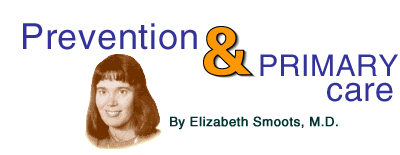| |
July 14, 2000
|
 |
LIVING WELL

What you can do to remedy bad breath We all know the embarrassment that can be caused by bad breath, or halitosis. Most people have an occasional bad breath day as a result of eating certain foods or forgetting to brush their teeth. But for certain people, bad breath day is every day. For those who are afflicted with chronic halitosis, effects can be worse than just an occasional embarrassing incident. Some 60 percent of women and 50 percent of men regularly use cosmetic breath fresheners to cover up unwanted odors. To cure bad breath, however, you need to remedy the cause. Halitosis can indicate several treatable mouth conditions and even a few serious ailments. Causes of bad breath
Normally, salivary flow in your mouth keeps your breath smelling fresh. Saliva has a cleansing action and, since it is usually slightly acidic, also helps prevent the growth of odor-causing bacteria. So anything that prompts a slowdown in your saliva or allows oral bacteria to propagate may lead to bad breath. Common causes of halitosis include the following:
Long periods of sleep. During your sleep the cleaning and antibacterial action of saliva may temporarily cease, making mouth odors worse when you awaken.
Dry mouth, or xerostomia, tends to occur as we grow older or when we're stressed, dieting, dehydrated, combating a cold, or breathing with an open mouth. A disorder of the salivary glands called Sjogren's syndrome can also cause dry mouth.
Drugs. Medications that dry out your mouth include diuretics and drugs for allergies, anxiety, depression, pain, Parkinson's disease, and high blood pressure.
Dental problems. Food sticking between your teeth and gums or on your tongue may promote plaque and gum disease, both of which can cause bad breath.
Corrective devices. Dentures, removable bridges, partial plates, and braces can trap decaying food particles.
Diet. Consumption of alcohol, tobacco, garlic, onions, peppers, pastrami, strong cheeses, and protein-rich or fatty foods may cause pungent mouth odors.
Medical conditions. Some serious diseases that may cause bad breath include diabetes, infections, cancer, respiratory problems, kidney or liver disease, and digestive disorders, especially those accompanied by belching or vomiting.
Home remedies
As stubborn as bad breath may be, several simple measures can help to alleviate it. If these measures don't help, or if halitosis keeps coming back, consult with your health care provider.
Brush your teeth twice a day, and floss at least once a day.
Brush your tongue.
Eat five or more servings of fruits and vegetables daily.
Cut down on meat, fatty foods, caffeinated beverages, and alcohol.
Stop smoking. Any type of tobacco product can cause bad breath.
If your mouth is dry, suck on sugar-free mints, chew sugar-free gum, and take frequent sips of water. Or you may try a saliva substitute with your provider's permission.
Gargle with a mouthwash; it may temporarily mask mouth odors. New oil-and-water rinses may remove bacteria more effectively.
Clean dentures and dental devices daily or according to your dentist's directions.
See your dentist at least twice a year to have your teeth cleaned and examined.
If plaque buildup is a problem, ask your provider about a prescription antibacterial mouth rinse with chlorhexidine, such as Peridex or PerioGard. Be aware that these products are reported to cause temporary dental staining.
Elizabeth Smoots, M.D., F.A.A.F.P., is a board-certified family physician in Seattle, Washington. A fellow of the American Academy of Family Physicians, Dr. Smoots writes about prevention and primary care medicine.
|

